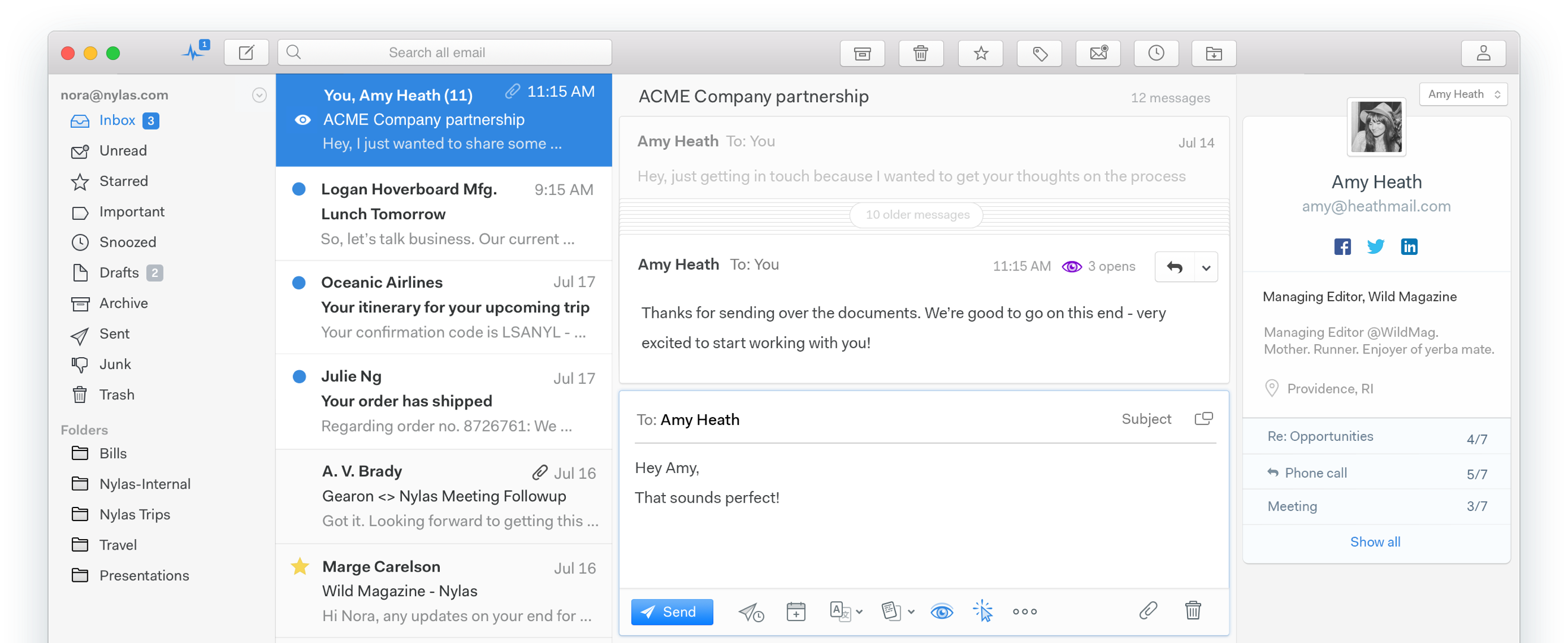Despite ongoing attacks from the world of (instant) messaging, email remains a central pillar of workplace communication.
By the end of 2019 there are expected to be more than 2.9 billion email users, who between them will send and receive in excess of 246 billion emails every day (in 2015 there were just 205 billion). As we are already drowning in too many emails anyway, a lot of other platforms are now on offer to provide alternative messaging options – from Slack and Yammer to Facebook Messenger, Hipchat and Kik all the way through to Google Hangouts. Despite all the speculation about the next upcoming “email killer”, no such conqueror has thus far appeared and the decades-old means of communication still retains its relevance.
The fact that our inboxes are overflowing with jokes and marketing messages, in addition to emails relevant to real business, has already driven some users to declare email bankruptcy and led to trumpeted celebrations of the occasional “Inbox Zero”. We are quick to complain that providers like Microsoft, Google or Yahoo are not doing enough to improve email. But this is not as easy as many people seem to think. And while we are toasting apps which are now achieving a billion users a month, we are quick to forget that these are all linked to an email address which acts as a universal form of identification for all our services, as Ken Yeung rightly points out in a feature on “VentureBeat”.
Find more statistics at Statista
Recent surveys indicate at first glance that younger people are turning to email less and less often, instead communicating by means of other, presumably more modern, channels such as SMS and instant messaging. But this by no means sounds out the death knell for email. “The problem with messaging is that it’s an immature system,” explains Jeff Bonforte, Yahoo’s senior vice president for communications products, who joined the bedrock internet company following the acquisition of his company Xobni in 2013. He is responsible for both the webmail service representing 280 million email accounts at Yahoo, as well as their proprietary messaging app. “Your [email] inbox is the only publicly accessible universal identity system that works across all systems and is a database that [people] can take anywhere.”
Bonforte can indeed understand that people feel oppressed by their overloaded inboxes, and so he knows that providers urgently need to take action in areas such as spam filtering and search options. His colleague and former head of Yahoo development, Peter Monaco, had already introduced the concept of a “communication graph” by which each email message was examined and indexed according to various aspects such as people, email, documents, photos, shopping or travel. In the meanwhile the corporation is carrying out such processes on a database of more than 50 petabytes of accumulated data, with enormous amounts of machine-learning, in order to generate added value for its customers.
Within two years, the highly complex project should be completed. A startup would have great difficulty replicating this development, Monaco believes. “You have to be an internet-scale company,” Monaco says, because companies won’t be able to make this happen with off-the-shelf technology. Over the longer term, Yahoo intends to extend this service beyond the confines of pure email search to other connected services such as Flickr, Dropbox, Google Drive or the Amazon Cloud and index all files which the user has saved in those services so that search results can be included, simplifying the discovery process even further.
Nevertheless, there are an increasing number of competing services attempting to woo users away from their inboxes. These services at first require you to authenticate yourself using your email address, after which all activity takes place in a modern app environment. Stewart Butterfield, co-founder and CEO of Slack, has jokingly called email the “cockroach of the internet” and considers the oldie to be weak in the area of team communication. “Companies have a choice now: They don’t have to do the lowest common denominator for their asset, people,” says Slack’s chief marketing officer Bill Macaitis. He considers the shift from email to messaging as a natural evolution or transition. “There will be a landscape where email and messaging work harmoniously together,” continues Macaitis. A central element in Slack’s strategy is the integration of third party apps – earlier this year already 280 were supported.
Peter Martinazzi, Director of Product Management for Facebook‘s messaging service, would like to see people and companies choosing Facebook Messenger as their preferred communication channel. He considers one of his platform’s benefits to be that it is more emotional. “When I open up Messenger, I smile because I see faces, and that’s different. Email feels like there’s tasks that you have to complete. It doesn’t have the life and the people view that messaging has.” Facebook is attempting to position its messaging service as a comprehensive, all-round communication platform – in the same way as WeChat or several other, mainly Asian, apps such as Line or Kik. Facebook Messenger and WhatsApp, also a Facebook company, are now already processing more than 60 billion messages a day, three times the number of SMS sent daily.
For instant messaging one doesn’t have to recall any email addresses. Sending a message may also feel more like engaging in a real everyday conversation. But messaging apps have their own difficulties with regard to organization and searching – and should a provider ever go out of business, all conversations would be lost. Facebook manager Martinazzi believes that the new communication channel is only at the very beginning of its potential and hopes that we’re all “going to communicate more and more” with better tools.
Essential, especially for marketing purposes
Companies are amongst those unwilling to give up email, especially so for marketing purposes. In a survey in 2014, 55 percent of participating companies stated that they generated more than ten percent of their revenue by means of email. At the same time brands elsewhere indicated that the medium was “almost 40 times better at acquiring new customers compared to Twitter and Facebook.”
“Email works,” summarizes Eric Stahl, senior vice president of product marketing for Marketing Cloud at Salesforce, which acquired ExactTarget to give brands additional tools. “If there’s another channel to measure opens, clicks, purchases, conversions, or better results, people would move. It’s not a question about why [brands] use it. … Customers tell [Salesforce] that email is a critical part of their infrastructure.”
Salesforce naturally also provides services for both email and social media. But in that Stahl does not see any contradiction – social media targeting and email marketing accomplish very different tasks. He considers permission-based email marketing, for which users have to expressly grant their permission before a company can contact them, to be especially promising.
It is astonishing, nevertheless, to which extent even purely web-based social media platforms still rely on email. Twitter, for instance, sends at least 22 different kinds of email notifications to its users – including when they receive a direct message or have a new follower. Even communication apps don’t get around email because the native push messaging offered by the app is simply not sufficient. “Mail works with every app, every operating system. It’s completely accessible across all systems,” explains Yahoo’s Bonforte.
Startup activity booming
The fact that email is still alive and well is attested to by startups such as Handle, Polymail, Boomerang, Front and many others looking to innovate in the field. With some really interesting approaches, these companies have forced more established players to strengthen themselves by means of takeovers – such as Yahoo-Xobni, LinkedIn-Rapportive, Microsoft-Accompli or Dropbox-Mailbox.
“There’s an incredible amount of data in email that’s valuable, but it’s locked down right now,” comments Michael Grinich, co-founder and CEO of Nylas, another company looking to develop email in a smart way. “Developers can’t build on top of it, and end users can’t access it,” he says. “The tools you have are 15 years old — they haven’t changed in over a decade.”
Nylas is developing a platform for email-powered applications. The startup is offering “n1”, an open-source email client as an alternative to Outlook, Thunderbird and Gmail, which can be integrated with third-party extensions. Administrators are able to adapt n1 so that it is tailored to the needs of their own employees. Nylas moreover offers a cloud solution that Grinich describes as the “foundation for a new email experience” and which offers the additional flexibility of customizing the email workflow for the whole company.
“The frustrations with email are related to the fact that over the past 10 to 15 years, the end user email tools haven’t gotten better like other tools,” comments Grinich, who just like Bonforte believes that email will experience a renaissance. Nylas would like to make its own modest contribution with a “focused version of a product for a subset of users.” And a huge amount of people seem to be showing interest – in excess of 3 million GitHub projects have been started, which Grinich calls “unprecedented for a mail app.” Nylas is generating interest with his platform spanning a range of ecosystems mainly from established providers on the lookout for new opportunities to differentiate themselves by adding value for their customers.
Retarus’ Cloud E-Mail Services can assist you in coping with this rising flood of email. Many of our managed services can incidentally be deployed in combination with Exchange Online in Microsoft Office 365 – for instance, to enhance its security features. Companies can, moreover, use Retarus’ Cloud Fax Services to expand Microsoft’s Skype for Business Online by adding sophisticated fax functions. You can obtain more details about Retarus’ Cloud Services directly from your local Retarus contact person.





